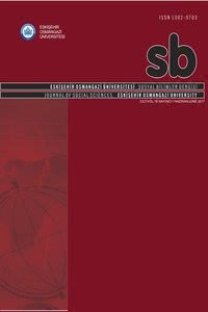Russia's Road to Minsk: Developments from the August Coup to the Formation of the Commonwealth of Independent States
Russya'nın Minsk'e Uzanan Yolu: Ağustos Darbesinden Bağımsız Devletler Topluluğunun Kuruluşuna Kadar Yaşanan Gelişmeler
___
- Aron, L.(2005). Where is Russia headed? , USA Today, May, 9.
- Aslund, A. (1991) The Soviet Economy After the Coup, Problems of Communism (Nov.-Dec), pp. 44-52.
- Aslund, A. (1992) Russia's Road from Communism, Daedalus (Spring), pp. 77-95.
- Baker, P. (2004) Putin Moves to Centralize Authority Washington Post (September 14).
- Beissinger, M. R. (1991) The Deconstruction of the USSR and the Search for a Post- Soviet Community, Problems of Communism, (Nov.- Dec), pp. 27-35.
- Breslauer, G. W. (1991) Bursting the Dams: Politics and Society in the USSR Since the Coup, Problems of Communism, (Nov.-Dec), pp. 2-12.
- Bush, K. (1991) El'tsin's Economic Reform Program Radio Free Europe, Radio Liberty; The Report on the USSR (ROTU) (Nov. 15), pp. 1-6.
- Carrere d'Encausse, H. (1993) The End of the Soviet Empire (trans, by F. Philip) New York: New Republic
- Çomak İ. (no date) Üç İmparatorluk ve Putin İmparatorluğu available at http://www.usak. org. uk/junction.asp?mod= articles&st=PrintArtic leDetail&id=62&lm =58649JLFD0932&ln=TR (last accessed 27. 03. 2006).
- Dunlop, J. B. (1993) The Rise of Russia and the Fall of the Soviet Empire, New Jersey: Princeton University Press.
- Foye, S. (1991) Evgenii Shaposhnikov: A new Defense Minister for a New Era, ROTU(3 Sep.), pp. 8-11.
- Galeotti, M. (1991) The Role of the Security Forces, ROTU, (6 Sep.), pp. 5-8.
- Gill, G. (1992) The Collapse of a Single Party, Cambridge: Cambridge University Press.
- Goldgeier M. and M. McFaul (2005) What To Do About Russia, Policy Review, no: 133, pp. 45-62.
- Gorşhkov, M.K. (2006) Perestroika Through the Eyes of Russians: Twenty Years Later Russian Social Science Review, 47 (1), pp. 4-72.
- Horrigan, B.L. and T. Karasik (1992) The Rise of Presidential Power under Gorbachev, in E. Huskey (eds.) Executive Power and Soviet Politics (New York: M.E. Sharpe), pp. 106-128.
- Kampfner, J. (1994) Inside Yeltsin's Russia (London: Cassell) Karatnycky,A. (1992) The Ukrainian Factor, Foreign Affairs (Summer), pp. 90-107.
- Khasbulatov, R. (1993) The Struggle for Russia (London: Routledge). Knox, Z. Et al (2006) Parties of Power and Russian Politics: A Victory of the State over Civil Society? Problems of Post-Communism, 53 (1), pp. 3-14.
- Kolakowski, L. (1992) Amidst Moving Ruins, Daedalus, (Spring), pp. 43- 56.
- Malia, M. (1992) Leninist Endgame, Daedalus, (Spring), pp. 57-75. Mann, D. (1991) The Circumstances Surrounding the Conservative Putsch, ROW, (6 Sep.), pp. 1-5.
- Miller, J. (1993) Mikhail Gorbachev and the End of Soviet Politics, London: Macmillan.
- Morrison, J. (1991) Boris Yeltsin: From Bolshevik to Democrat, New York: Dutton.
- Nahoylo, B. (1991) The Birth of an Independent Ukraine, ROW (13 Dec), pp. 1-5
- Primakov Ye. (2005) Russian Economy and World Affairs International Affairs :A Russian Journal of World Politics, Diplomacy and International Relations, 2005 / 3, pp. 33-41.
- Rahr, A. (1991) Russia's 'Young Turks' in Power, ROW (Nov. 22), pp. 20-23.
- Rahr, A. (1992) El'tsin Eclipses Gorbachev as Hard-line Coup Fails, ROW, (3 Jan), pp. 9-11.
- Rywkin, M. (1994) Moscow's Lost Empire, London: M. E. Sharpe.
- Sakwa, R. (1993) Russian Politics and Society, London: Routledge.
- Sheey, A. (1991) The RSFSR and a Future Union, ROTU, (11 Oct.), pp. 3-4.
- Sixmith, M. (1991) Moscow Coup: The Death of the Soviet System, London: Simon and Schuster.
- Solovyov, V. and E. Klepikova (1992) Boris Yeltsin: A Political Biography London: Weidenfeld and Nicolson.
- Steele, J. (1995) Eternal Russia: Yeltsin, Gorbachev and the Mirage of Democracy, London: Faber and Faber.
- Szporluk, R. (1992) The National Question in Colton T. J and R Levgold (eds) After the Soviet Union (London: Norton), pp. 84-112.
- Thorson, C. (1991a) The Collapse of the Constitutional Order, ROTU (18 Oct.), pp. 15-18.
- Thorson, C. (1991b) Has the Communist Party Been Legally Suspended, ROTU, (4 Oct.). pp. 4-8.
- White, S. et al (1993) The Politics of Transition: Shaping a Post-Soviet Future Cambridge: Cambridge University Press.
- Wikipedia Contributors (2006) Vladimir Putin. Wikipedia, The Free Encyclopedia. March 25, 2006, from http://en.wikipedia.org/vv/ index.php?title=Vladimir_Putin&oldid=45422314.
- Yeltsin, B. (1994) The View From the Kremlin London: HarperCollins. Zaslavsky, V. (1992) Nationalism and Democratic Transition in Post- Communist Societies, Daedalus (Spring), pp. 97-121.
- Zuckerman, M. B. (2006) The Russia Conundrum, U.S. News and World Report, 140(9).82
- Yayın Aralığı: 3
- Başlangıç: 2000
- Yayıncı: -
İngiliz Yerel Yönetimlerinde Performans Ölçüm Uygulamaları
Stratejik Bir Yapı Çerçevesinde Dengeli Ölçüm Kartı Tekniği (Balanced Scorecard) ve Bir Uygulama
Psikolojik Sözleşmelerin Oluşumu, Gelişimi ve İhlalinde Toplu ve Bireysel Sözleşmelerin Rolü
Ahmet Midhat Efendi’nin Türklüğe Dair İsimli Önemli Bir Konferansı
Avrupa Birliği'nin Enerji Arz Güvenliği İçin Dış Enerji Politikası Arayışları
Milli Mücadele Döneminde Kamuoyunun Oluşmasında Mitinglerin İşlevi
Sermaye Piyasalarında Düşük Fiyat Etkisi ve İstanbul Menkul Kıymetler Borsası'nda Bir Uygulama
Sermaye Piyasalarında Düşük Fiyat Etkisi ve İstanbul Menkul Kıymetler Borsası’nda Bir Uygulama
